Taxation Law Case Study: Analysis of Taxable Income and Expenses
VerifiedAdded on 2022/11/18
|7
|1694
|82
Case Study
AI Summary
This case study analyzes a taxation law scenario involving Thomas Hawks, a tax accountant. It addresses five key issues: personal service income, the choice between cash or accrual accounting methods, the deductibility of business expenses, the tax treatment of compensation received, and the distinction between business and hobby activities. The analysis applies relevant sections of the Income Tax Assessment Act 1936 and 1997, along with supporting case law and taxation rulings, to determine the correct tax treatment for each issue. The study covers topics such as personal service income, cash accounting, business expenses, compensation payments, and the business vs. hobby distinction, providing a comprehensive overview of the tax implications for Thomas's income and expenses. The case study concludes with a list of references used in the analysis.
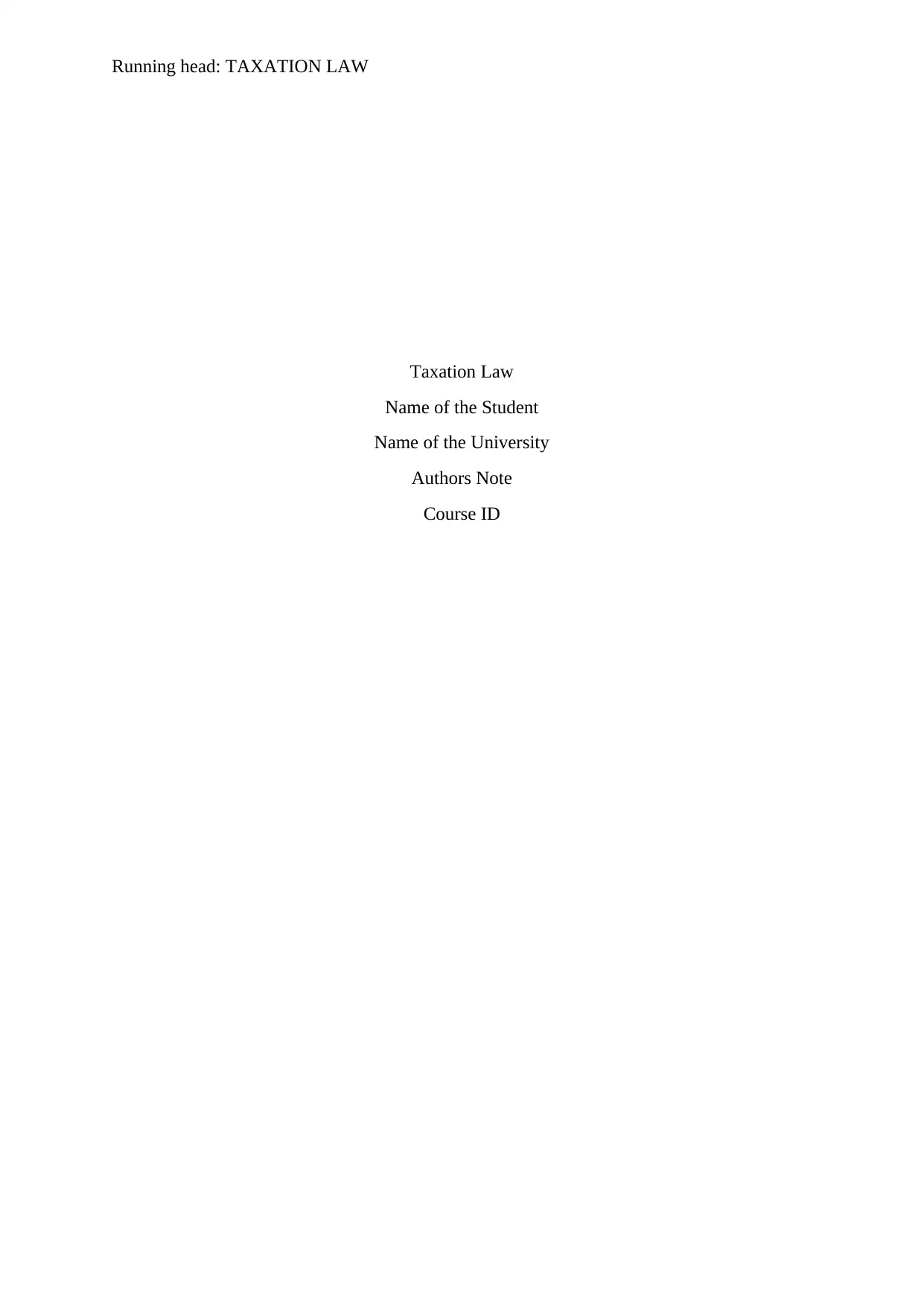
Running head: TAXATION LAW
Taxation Law
Name of the Student
Name of the University
Authors Note
Course ID
Taxation Law
Name of the Student
Name of the University
Authors Note
Course ID
Paraphrase This Document
Need a fresh take? Get an instant paraphrase of this document with our AI Paraphraser
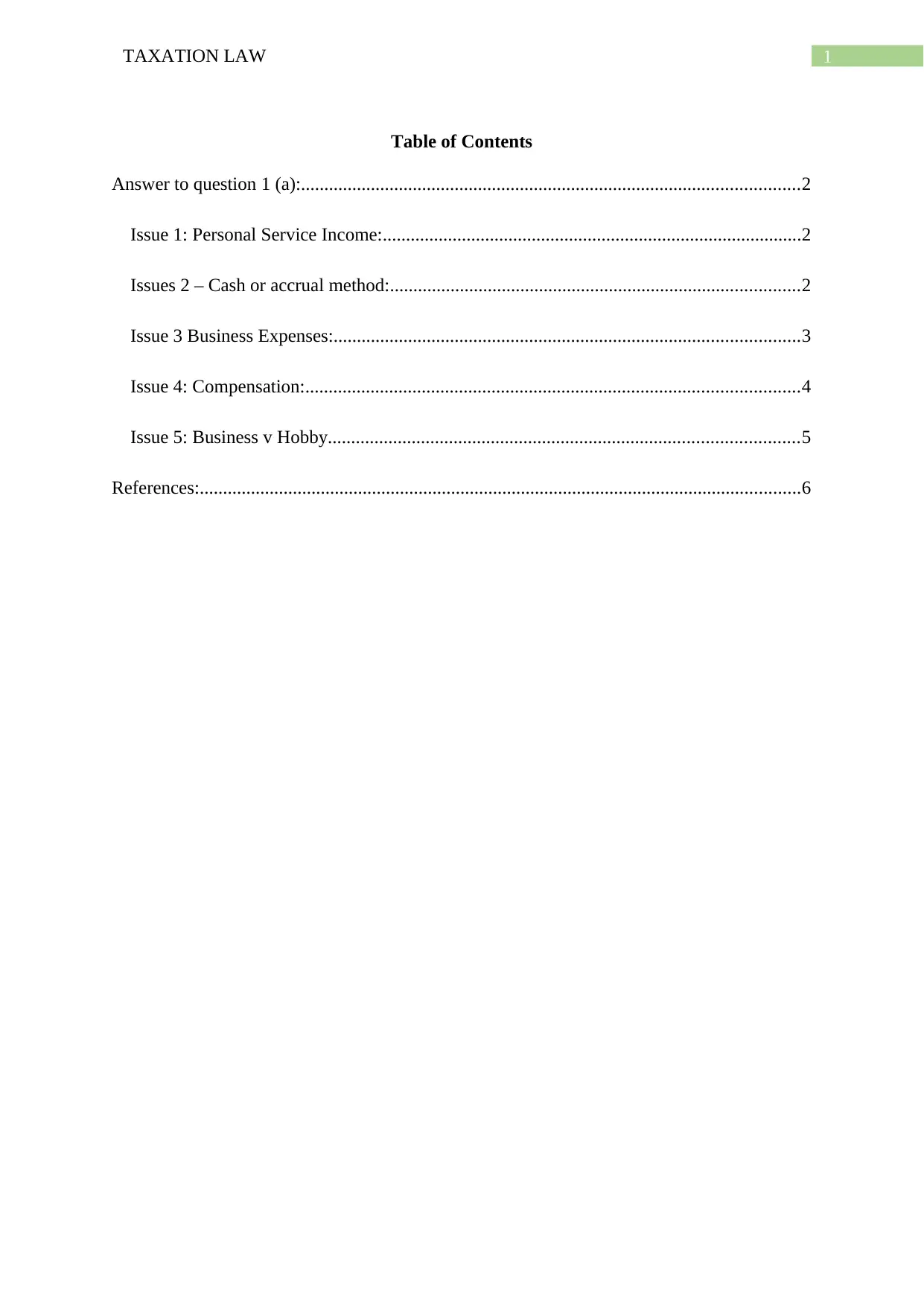
1TAXATION LAW
Table of Contents
Answer to question 1 (a):...........................................................................................................2
Issue 1: Personal Service Income:..........................................................................................2
Issues 2 – Cash or accrual method:........................................................................................2
Issue 3 Business Expenses:....................................................................................................3
Issue 4: Compensation:..........................................................................................................4
Issue 5: Business v Hobby.....................................................................................................5
References:.................................................................................................................................6
Table of Contents
Answer to question 1 (a):...........................................................................................................2
Issue 1: Personal Service Income:..........................................................................................2
Issues 2 – Cash or accrual method:........................................................................................2
Issue 3 Business Expenses:....................................................................................................3
Issue 4: Compensation:..........................................................................................................4
Issue 5: Business v Hobby.....................................................................................................5
References:.................................................................................................................................6
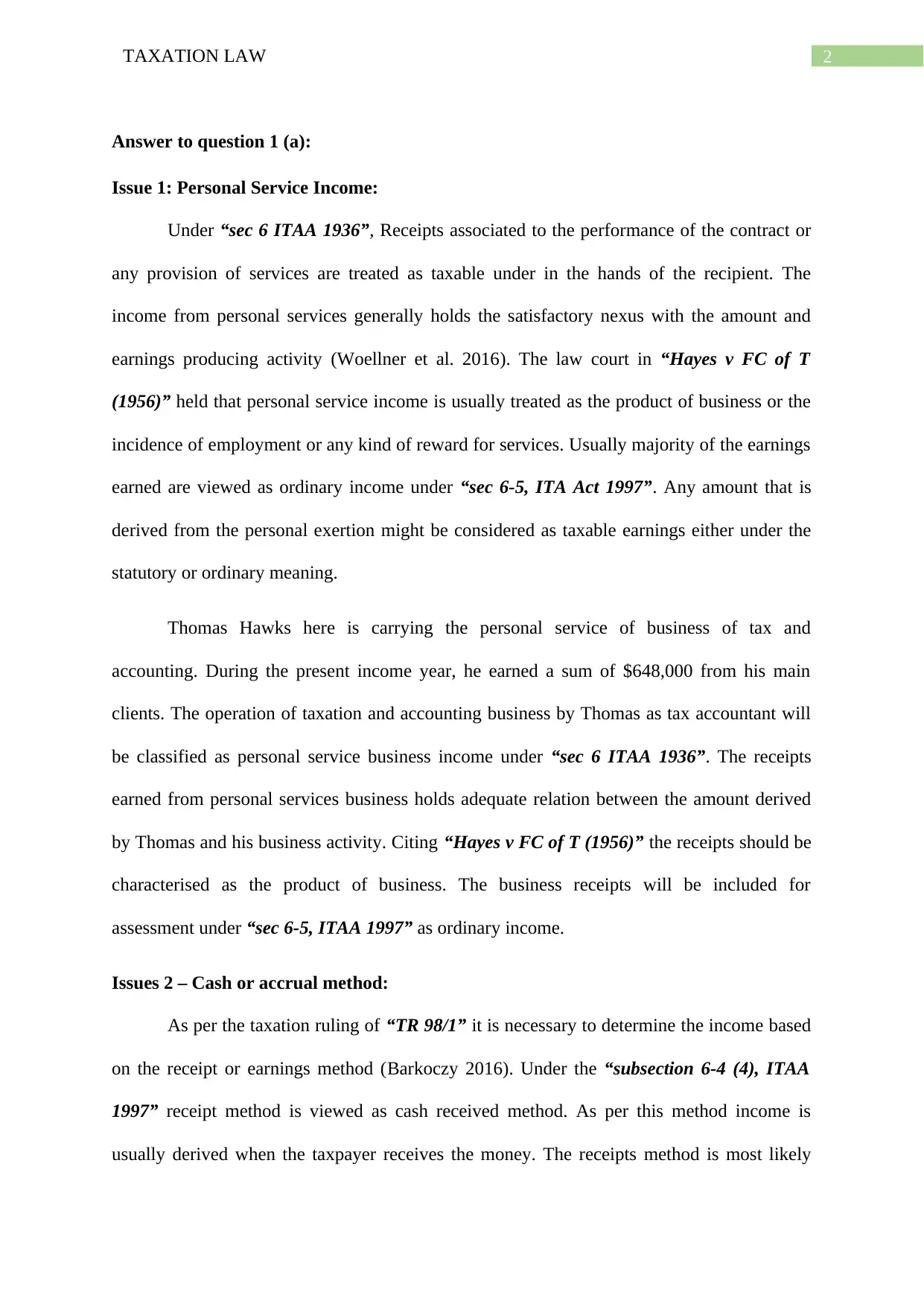
2TAXATION LAW
Answer to question 1 (a):
Issue 1: Personal Service Income:
Under “sec 6 ITAA 1936”, Receipts associated to the performance of the contract or
any provision of services are treated as taxable under in the hands of the recipient. The
income from personal services generally holds the satisfactory nexus with the amount and
earnings producing activity (Woellner et al. 2016). The law court in “Hayes v FC of T
(1956)” held that personal service income is usually treated as the product of business or the
incidence of employment or any kind of reward for services. Usually majority of the earnings
earned are viewed as ordinary income under “sec 6-5, ITA Act 1997”. Any amount that is
derived from the personal exertion might be considered as taxable earnings either under the
statutory or ordinary meaning.
Thomas Hawks here is carrying the personal service of business of tax and
accounting. During the present income year, he earned a sum of $648,000 from his main
clients. The operation of taxation and accounting business by Thomas as tax accountant will
be classified as personal service business income under “sec 6 ITAA 1936”. The receipts
earned from personal services business holds adequate relation between the amount derived
by Thomas and his business activity. Citing “Hayes v FC of T (1956)” the receipts should be
characterised as the product of business. The business receipts will be included for
assessment under “sec 6-5, ITAA 1997” as ordinary income.
Issues 2 – Cash or accrual method:
As per the taxation ruling of “TR 98/1” it is necessary to determine the income based
on the receipt or earnings method (Barkoczy 2016). Under the “subsection 6-4 (4), ITAA
1997” receipt method is viewed as cash received method. As per this method income is
usually derived when the taxpayer receives the money. The receipts method is most likely
Answer to question 1 (a):
Issue 1: Personal Service Income:
Under “sec 6 ITAA 1936”, Receipts associated to the performance of the contract or
any provision of services are treated as taxable under in the hands of the recipient. The
income from personal services generally holds the satisfactory nexus with the amount and
earnings producing activity (Woellner et al. 2016). The law court in “Hayes v FC of T
(1956)” held that personal service income is usually treated as the product of business or the
incidence of employment or any kind of reward for services. Usually majority of the earnings
earned are viewed as ordinary income under “sec 6-5, ITA Act 1997”. Any amount that is
derived from the personal exertion might be considered as taxable earnings either under the
statutory or ordinary meaning.
Thomas Hawks here is carrying the personal service of business of tax and
accounting. During the present income year, he earned a sum of $648,000 from his main
clients. The operation of taxation and accounting business by Thomas as tax accountant will
be classified as personal service business income under “sec 6 ITAA 1936”. The receipts
earned from personal services business holds adequate relation between the amount derived
by Thomas and his business activity. Citing “Hayes v FC of T (1956)” the receipts should be
characterised as the product of business. The business receipts will be included for
assessment under “sec 6-5, ITAA 1997” as ordinary income.
Issues 2 – Cash or accrual method:
As per the taxation ruling of “TR 98/1” it is necessary to determine the income based
on the receipt or earnings method (Barkoczy 2016). Under the “subsection 6-4 (4), ITAA
1997” receipt method is viewed as cash received method. As per this method income is
usually derived when the taxpayer receives the money. The receipts method is most likely
⊘ This is a preview!⊘
Do you want full access?
Subscribe today to unlock all pages.

Trusted by 1+ million students worldwide
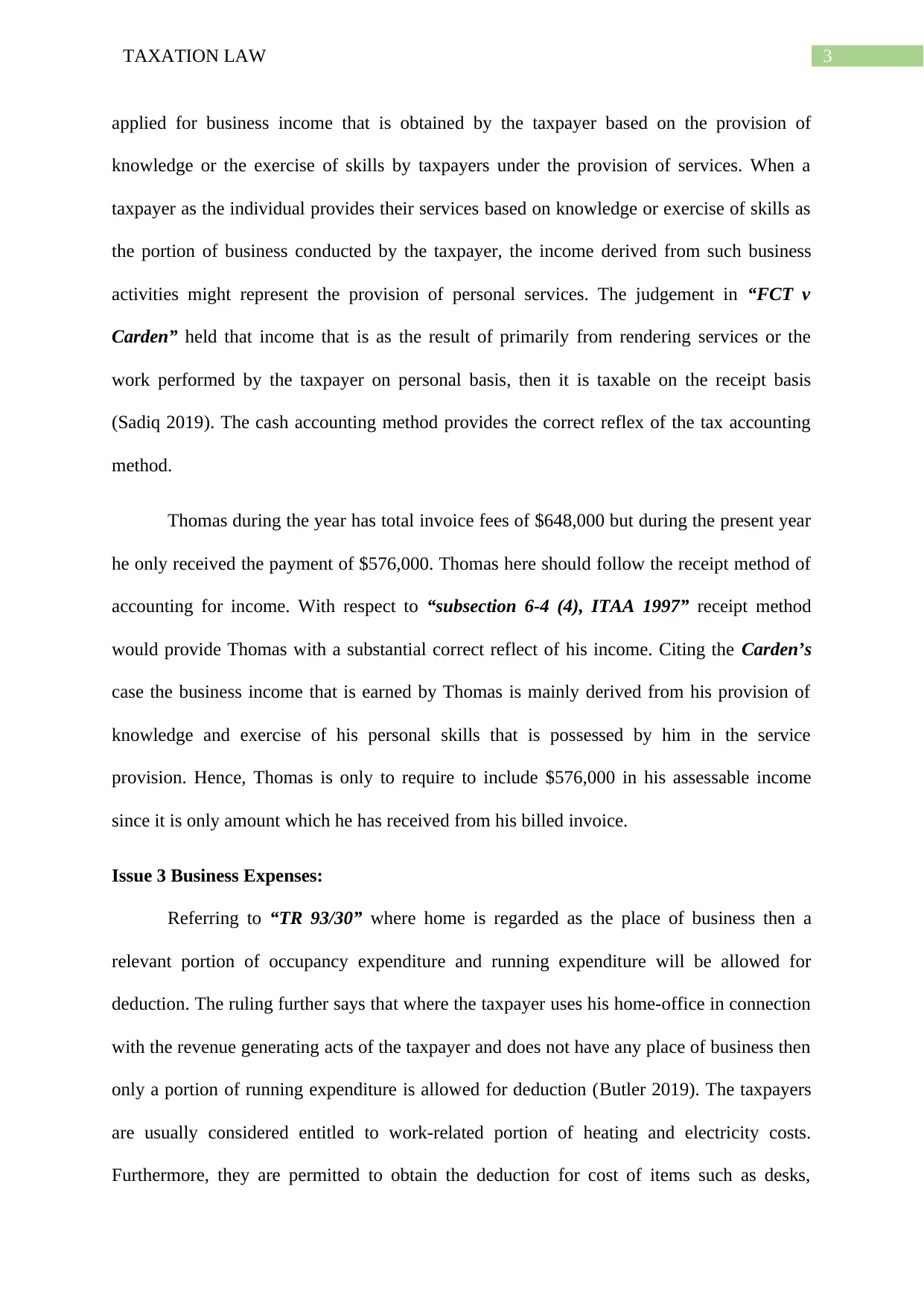
3TAXATION LAW
applied for business income that is obtained by the taxpayer based on the provision of
knowledge or the exercise of skills by taxpayers under the provision of services. When a
taxpayer as the individual provides their services based on knowledge or exercise of skills as
the portion of business conducted by the taxpayer, the income derived from such business
activities might represent the provision of personal services. The judgement in “FCT v
Carden” held that income that is as the result of primarily from rendering services or the
work performed by the taxpayer on personal basis, then it is taxable on the receipt basis
(Sadiq 2019). The cash accounting method provides the correct reflex of the tax accounting
method.
Thomas during the year has total invoice fees of $648,000 but during the present year
he only received the payment of $576,000. Thomas here should follow the receipt method of
accounting for income. With respect to “subsection 6-4 (4), ITAA 1997” receipt method
would provide Thomas with a substantial correct reflect of his income. Citing the Carden’s
case the business income that is earned by Thomas is mainly derived from his provision of
knowledge and exercise of his personal skills that is possessed by him in the service
provision. Hence, Thomas is only to require to include $576,000 in his assessable income
since it is only amount which he has received from his billed invoice.
Issue 3 Business Expenses:
Referring to “TR 93/30” where home is regarded as the place of business then a
relevant portion of occupancy expenditure and running expenditure will be allowed for
deduction. The ruling further says that where the taxpayer uses his home-office in connection
with the revenue generating acts of the taxpayer and does not have any place of business then
only a portion of running expenditure is allowed for deduction (Butler 2019). The taxpayers
are usually considered entitled to work-related portion of heating and electricity costs.
Furthermore, they are permitted to obtain the deduction for cost of items such as desks,
applied for business income that is obtained by the taxpayer based on the provision of
knowledge or the exercise of skills by taxpayers under the provision of services. When a
taxpayer as the individual provides their services based on knowledge or exercise of skills as
the portion of business conducted by the taxpayer, the income derived from such business
activities might represent the provision of personal services. The judgement in “FCT v
Carden” held that income that is as the result of primarily from rendering services or the
work performed by the taxpayer on personal basis, then it is taxable on the receipt basis
(Sadiq 2019). The cash accounting method provides the correct reflex of the tax accounting
method.
Thomas during the year has total invoice fees of $648,000 but during the present year
he only received the payment of $576,000. Thomas here should follow the receipt method of
accounting for income. With respect to “subsection 6-4 (4), ITAA 1997” receipt method
would provide Thomas with a substantial correct reflect of his income. Citing the Carden’s
case the business income that is earned by Thomas is mainly derived from his provision of
knowledge and exercise of his personal skills that is possessed by him in the service
provision. Hence, Thomas is only to require to include $576,000 in his assessable income
since it is only amount which he has received from his billed invoice.
Issue 3 Business Expenses:
Referring to “TR 93/30” where home is regarded as the place of business then a
relevant portion of occupancy expenditure and running expenditure will be allowed for
deduction. The ruling further says that where the taxpayer uses his home-office in connection
with the revenue generating acts of the taxpayer and does not have any place of business then
only a portion of running expenditure is allowed for deduction (Butler 2019). The taxpayers
are usually considered entitled to work-related portion of heating and electricity costs.
Furthermore, they are permitted to obtain the deduction for cost of items such as desks,
Paraphrase This Document
Need a fresh take? Get an instant paraphrase of this document with our AI Paraphraser
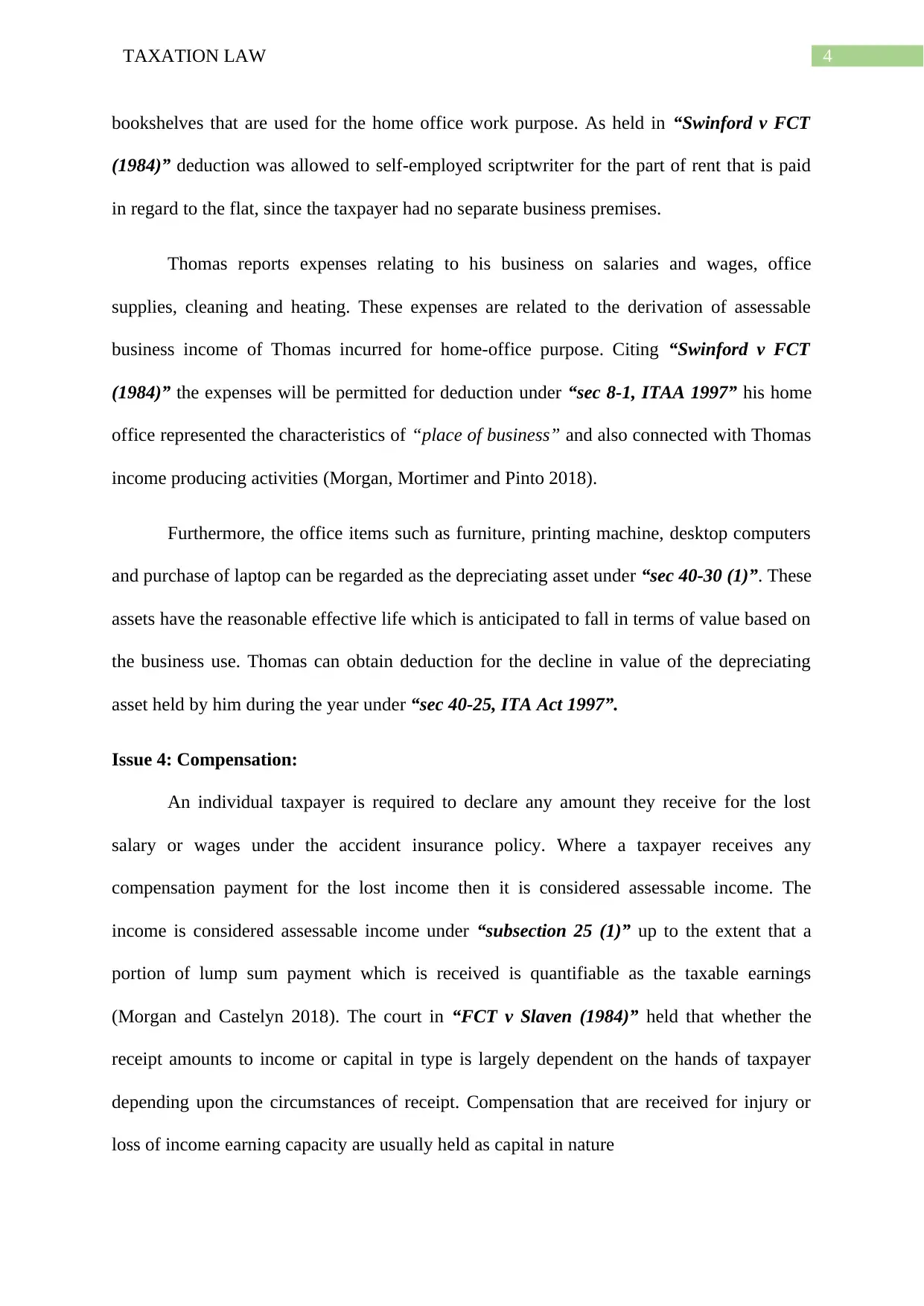
4TAXATION LAW
bookshelves that are used for the home office work purpose. As held in “Swinford v FCT
(1984)” deduction was allowed to self-employed scriptwriter for the part of rent that is paid
in regard to the flat, since the taxpayer had no separate business premises.
Thomas reports expenses relating to his business on salaries and wages, office
supplies, cleaning and heating. These expenses are related to the derivation of assessable
business income of Thomas incurred for home-office purpose. Citing “Swinford v FCT
(1984)” the expenses will be permitted for deduction under “sec 8-1, ITAA 1997” his home
office represented the characteristics of “place of business” and also connected with Thomas
income producing activities (Morgan, Mortimer and Pinto 2018).
Furthermore, the office items such as furniture, printing machine, desktop computers
and purchase of laptop can be regarded as the depreciating asset under “sec 40-30 (1)”. These
assets have the reasonable effective life which is anticipated to fall in terms of value based on
the business use. Thomas can obtain deduction for the decline in value of the depreciating
asset held by him during the year under “sec 40-25, ITA Act 1997”.
Issue 4: Compensation:
An individual taxpayer is required to declare any amount they receive for the lost
salary or wages under the accident insurance policy. Where a taxpayer receives any
compensation payment for the lost income then it is considered assessable income. The
income is considered assessable income under “subsection 25 (1)” up to the extent that a
portion of lump sum payment which is received is quantifiable as the taxable earnings
(Morgan and Castelyn 2018). The court in “FCT v Slaven (1984)” held that whether the
receipt amounts to income or capital in type is largely dependent on the hands of taxpayer
depending upon the circumstances of receipt. Compensation that are received for injury or
loss of income earning capacity are usually held as capital in nature
bookshelves that are used for the home office work purpose. As held in “Swinford v FCT
(1984)” deduction was allowed to self-employed scriptwriter for the part of rent that is paid
in regard to the flat, since the taxpayer had no separate business premises.
Thomas reports expenses relating to his business on salaries and wages, office
supplies, cleaning and heating. These expenses are related to the derivation of assessable
business income of Thomas incurred for home-office purpose. Citing “Swinford v FCT
(1984)” the expenses will be permitted for deduction under “sec 8-1, ITAA 1997” his home
office represented the characteristics of “place of business” and also connected with Thomas
income producing activities (Morgan, Mortimer and Pinto 2018).
Furthermore, the office items such as furniture, printing machine, desktop computers
and purchase of laptop can be regarded as the depreciating asset under “sec 40-30 (1)”. These
assets have the reasonable effective life which is anticipated to fall in terms of value based on
the business use. Thomas can obtain deduction for the decline in value of the depreciating
asset held by him during the year under “sec 40-25, ITA Act 1997”.
Issue 4: Compensation:
An individual taxpayer is required to declare any amount they receive for the lost
salary or wages under the accident insurance policy. Where a taxpayer receives any
compensation payment for the lost income then it is considered assessable income. The
income is considered assessable income under “subsection 25 (1)” up to the extent that a
portion of lump sum payment which is received is quantifiable as the taxable earnings
(Morgan and Castelyn 2018). The court in “FCT v Slaven (1984)” held that whether the
receipt amounts to income or capital in type is largely dependent on the hands of taxpayer
depending upon the circumstances of receipt. Compensation that are received for injury or
loss of income earning capacity are usually held as capital in nature
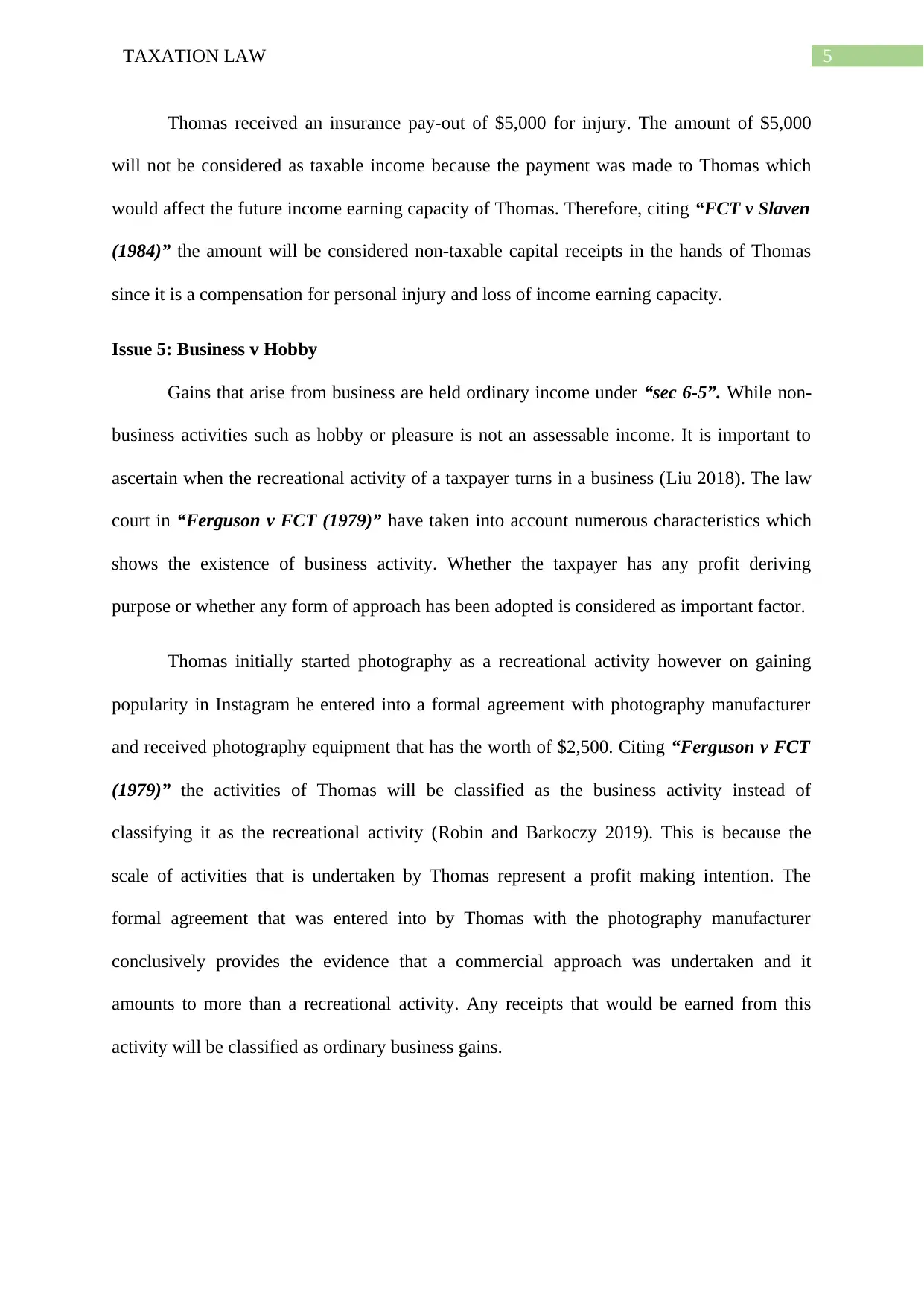
5TAXATION LAW
Thomas received an insurance pay-out of $5,000 for injury. The amount of $5,000
will not be considered as taxable income because the payment was made to Thomas which
would affect the future income earning capacity of Thomas. Therefore, citing “FCT v Slaven
(1984)” the amount will be considered non-taxable capital receipts in the hands of Thomas
since it is a compensation for personal injury and loss of income earning capacity.
Issue 5: Business v Hobby
Gains that arise from business are held ordinary income under “sec 6-5”. While non-
business activities such as hobby or pleasure is not an assessable income. It is important to
ascertain when the recreational activity of a taxpayer turns in a business (Liu 2018). The law
court in “Ferguson v FCT (1979)” have taken into account numerous characteristics which
shows the existence of business activity. Whether the taxpayer has any profit deriving
purpose or whether any form of approach has been adopted is considered as important factor.
Thomas initially started photography as a recreational activity however on gaining
popularity in Instagram he entered into a formal agreement with photography manufacturer
and received photography equipment that has the worth of $2,500. Citing “Ferguson v FCT
(1979)” the activities of Thomas will be classified as the business activity instead of
classifying it as the recreational activity (Robin and Barkoczy 2019). This is because the
scale of activities that is undertaken by Thomas represent a profit making intention. The
formal agreement that was entered into by Thomas with the photography manufacturer
conclusively provides the evidence that a commercial approach was undertaken and it
amounts to more than a recreational activity. Any receipts that would be earned from this
activity will be classified as ordinary business gains.
Thomas received an insurance pay-out of $5,000 for injury. The amount of $5,000
will not be considered as taxable income because the payment was made to Thomas which
would affect the future income earning capacity of Thomas. Therefore, citing “FCT v Slaven
(1984)” the amount will be considered non-taxable capital receipts in the hands of Thomas
since it is a compensation for personal injury and loss of income earning capacity.
Issue 5: Business v Hobby
Gains that arise from business are held ordinary income under “sec 6-5”. While non-
business activities such as hobby or pleasure is not an assessable income. It is important to
ascertain when the recreational activity of a taxpayer turns in a business (Liu 2018). The law
court in “Ferguson v FCT (1979)” have taken into account numerous characteristics which
shows the existence of business activity. Whether the taxpayer has any profit deriving
purpose or whether any form of approach has been adopted is considered as important factor.
Thomas initially started photography as a recreational activity however on gaining
popularity in Instagram he entered into a formal agreement with photography manufacturer
and received photography equipment that has the worth of $2,500. Citing “Ferguson v FCT
(1979)” the activities of Thomas will be classified as the business activity instead of
classifying it as the recreational activity (Robin and Barkoczy 2019). This is because the
scale of activities that is undertaken by Thomas represent a profit making intention. The
formal agreement that was entered into by Thomas with the photography manufacturer
conclusively provides the evidence that a commercial approach was undertaken and it
amounts to more than a recreational activity. Any receipts that would be earned from this
activity will be classified as ordinary business gains.
⊘ This is a preview!⊘
Do you want full access?
Subscribe today to unlock all pages.

Trusted by 1+ million students worldwide
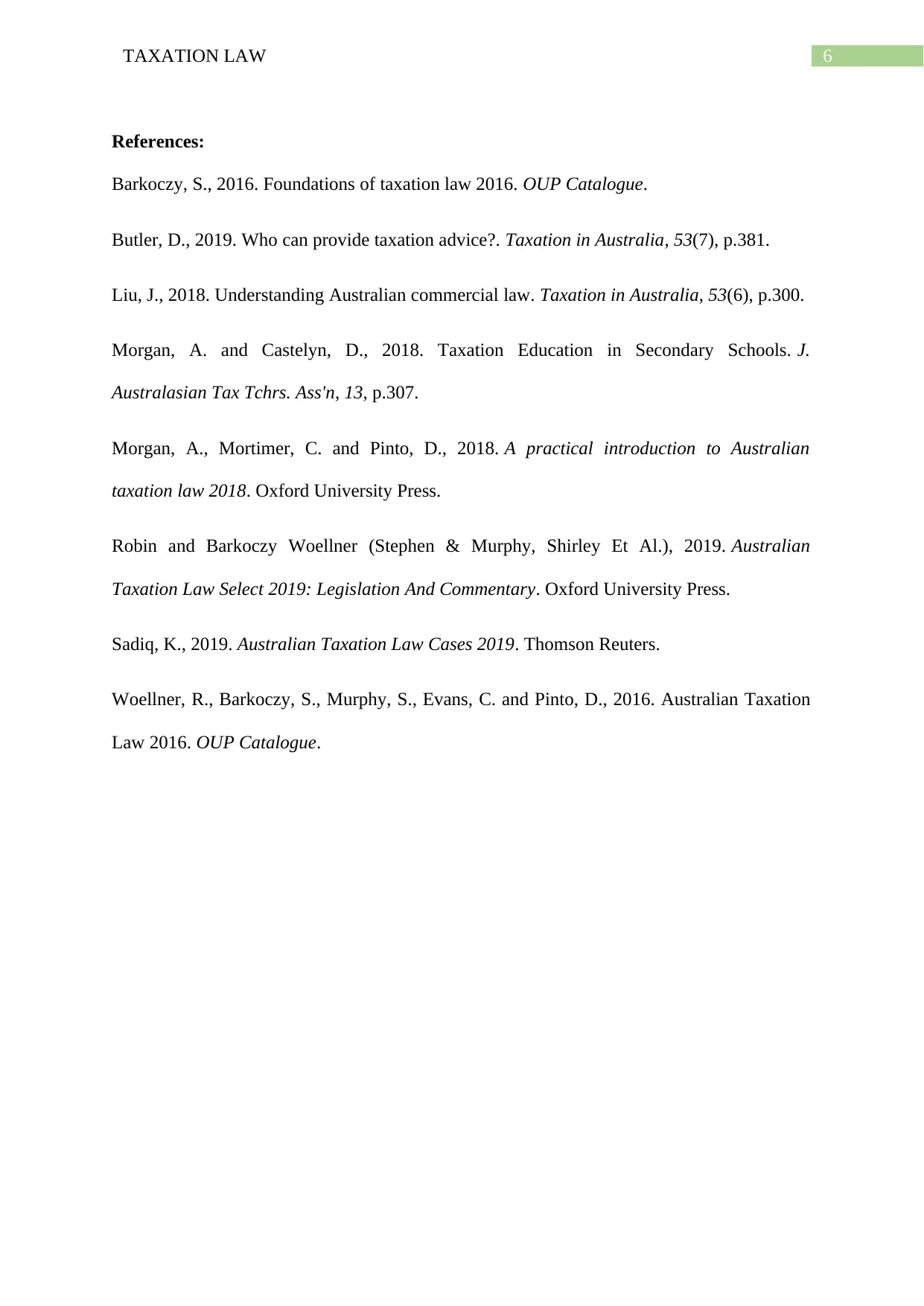
6TAXATION LAW
References:
Barkoczy, S., 2016. Foundations of taxation law 2016. OUP Catalogue.
Butler, D., 2019. Who can provide taxation advice?. Taxation in Australia, 53(7), p.381.
Liu, J., 2018. Understanding Australian commercial law. Taxation in Australia, 53(6), p.300.
Morgan, A. and Castelyn, D., 2018. Taxation Education in Secondary Schools. J.
Australasian Tax Tchrs. Ass'n, 13, p.307.
Morgan, A., Mortimer, C. and Pinto, D., 2018. A practical introduction to Australian
taxation law 2018. Oxford University Press.
Robin and Barkoczy Woellner (Stephen & Murphy, Shirley Et Al.), 2019. Australian
Taxation Law Select 2019: Legislation And Commentary. Oxford University Press.
Sadiq, K., 2019. Australian Taxation Law Cases 2019. Thomson Reuters.
Woellner, R., Barkoczy, S., Murphy, S., Evans, C. and Pinto, D., 2016. Australian Taxation
Law 2016. OUP Catalogue.
References:
Barkoczy, S., 2016. Foundations of taxation law 2016. OUP Catalogue.
Butler, D., 2019. Who can provide taxation advice?. Taxation in Australia, 53(7), p.381.
Liu, J., 2018. Understanding Australian commercial law. Taxation in Australia, 53(6), p.300.
Morgan, A. and Castelyn, D., 2018. Taxation Education in Secondary Schools. J.
Australasian Tax Tchrs. Ass'n, 13, p.307.
Morgan, A., Mortimer, C. and Pinto, D., 2018. A practical introduction to Australian
taxation law 2018. Oxford University Press.
Robin and Barkoczy Woellner (Stephen & Murphy, Shirley Et Al.), 2019. Australian
Taxation Law Select 2019: Legislation And Commentary. Oxford University Press.
Sadiq, K., 2019. Australian Taxation Law Cases 2019. Thomson Reuters.
Woellner, R., Barkoczy, S., Murphy, S., Evans, C. and Pinto, D., 2016. Australian Taxation
Law 2016. OUP Catalogue.
1 out of 7
Related Documents
Your All-in-One AI-Powered Toolkit for Academic Success.
+13062052269
info@desklib.com
Available 24*7 on WhatsApp / Email
![[object Object]](/_next/static/media/star-bottom.7253800d.svg)
Unlock your academic potential
Copyright © 2020–2026 A2Z Services. All Rights Reserved. Developed and managed by ZUCOL.





